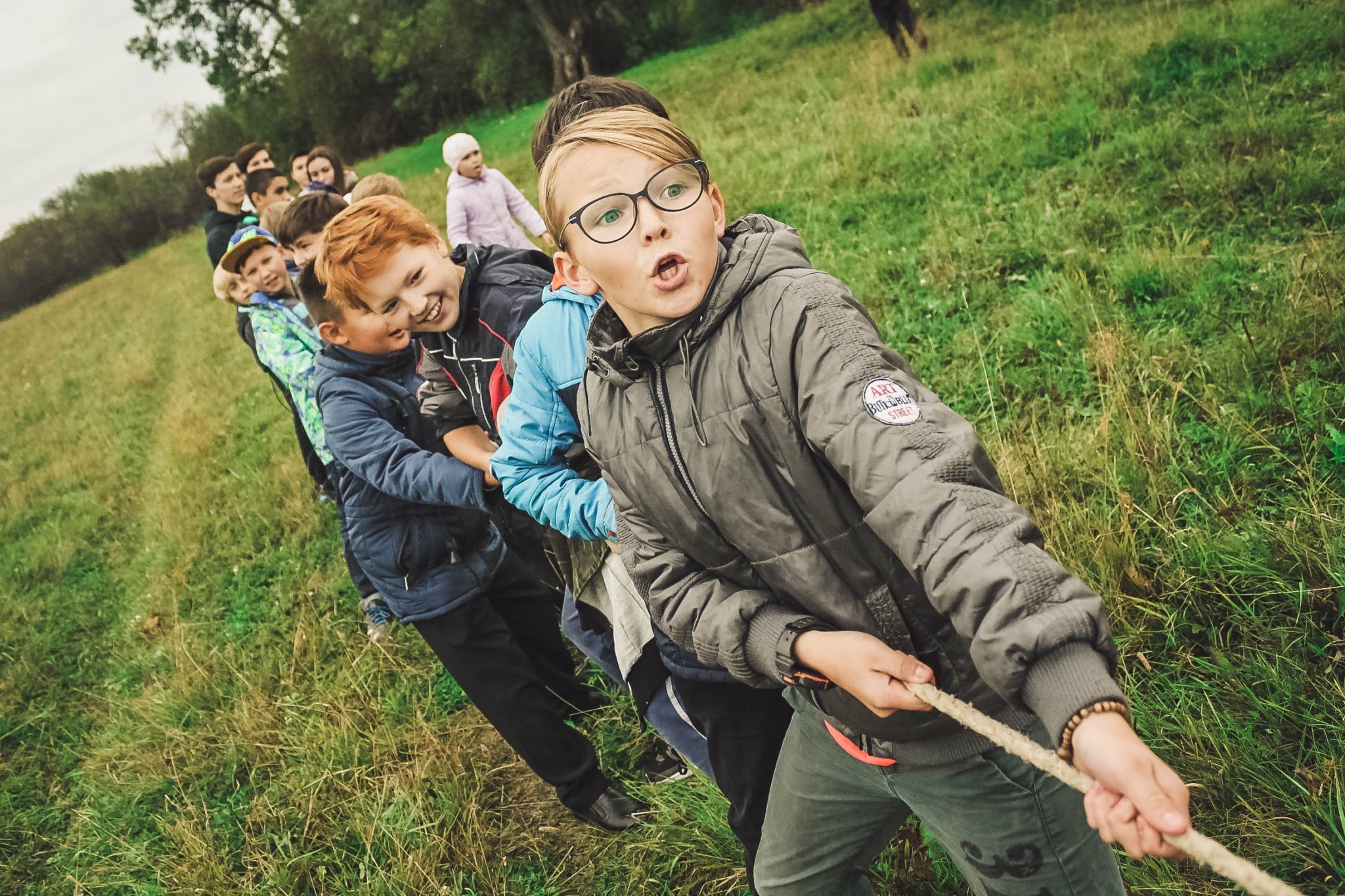What’s the true meaning of summer camp? Is it learning skills – like building a fire or paddling a canoe? Is it making friends or taking college prep courses? The truth is, the “true meaning” varies for everyone. It’s different for career camp counselors and kids than it is for administrators. The beautiful thing about camp is that, as varied and diverse as the experiences that arise from it are, it offers a foundation everyone can relate to: the story of summer camp.
The story is the true meaning – the real bedrock from which everything else springs.
As a summer camp director or owner, some may think your job is creating programs and managing enrollment. But you know better. You know that your job is to be the guardian of the iconic summer camp story – to create a space where campers from across the country can come and do something real. Where they can go and have experiences that feel authentic and affecting. Where they can do something that changes them. Your job is to find ways to communicate the story of your summer camp and to share it with all campers – both new and old.
Why Camp is so Iconic
 In every life, there are a few watershed moments. These benchmark experiences change the course of things – they place us on different paths and define the minutes, years, or decades that come next. The high school dance, the first kiss, the first night away from family, sleeping in a college dorm, graduation, and – yes – summer camp.
In every life, there are a few watershed moments. These benchmark experiences change the course of things – they place us on different paths and define the minutes, years, or decades that come next. The high school dance, the first kiss, the first night away from family, sleeping in a college dorm, graduation, and – yes – summer camp.
When you think of summer camp, you probably picture groups of carefree, adventurous kids, forging friendships, laughing, learning new things. You might think of golden, evening light through tall trees, windblown hair, and sun-warmed skin. Maybe you picture kind counselors ready to right every wrong and guide campers through trying moments. You might feel the soft squish of s’mores, the firmness of the bunk beds, the chill of a good ghost story, or the warmth of a campfire. These are iconic summer camp experiences, and they stick with us for life.
Ask people who went to camp as children, and many will tell you that they’ve never experienced the same feeling of belonging or place since then. This is why America is so rightfully obsessed with the summer camp experience – it provides a foundation for so many stories and experiences. Camp programs might teach us how to start a fire, sure, but they also teach us how to unplug, solve problems, be independent, and connect to the people and places around us.
Camps as a Lesson in History and Diversity
One of the unique aspects of the modern camp experience is that it brings together groups of people who might not ever meet, otherwise. Most camp programs welcome campers of all backgrounds, colors, creeds, walks of life, family structures, and locations. Camp is a lesson in co-existence that we seldom see in our increasingly fractured and divided society. Even better, many camps combine that mindset of diversity and inclusion with an experience of history and place.
When we did our #backtocamp2017 series, our account manager Danny Pire shared his own experience with the deep history camps offer:
“When I arrived at each camp, I immediately noticed the smiles on all the faces of the staff, counselors, and of course, the campers. The second thing that hit me was the history within the grounds of every camp. Many of the camps I visited had been around for a very long time – such as Camp Greystone, which has been operating since 1920, and Camp Mondamin, which started in 1922. Camp Rockbrook was actually started by an inheritor of P.T. Barnum – from the famous Barnum and Bailey Circus. The amount of history I got to experience over the course of my back-to-camp tour blew my mind! It was like getting a window into the real meaning of summer camp.”
Regardless of what drew you to camp in the first place, or what you take from your experience there now, one thing is certain: camp is almost mythical in its ability to make us feel and to bring us alive. And camps with a strong sense of themselves and their stories are particularly good at this.
How to Tell Your Camp’s Story
While all summer camps have a story, none of those stories are the same. What makes a camp unforgettable is the way it shares its story and nurtures a culture of stories within campers. Here are some ideas for your camp to share its story this season, and every year after that:
1. Encourage Stories at Camp
Stories generate stories. One of the best ways to create more of them in your camp is to encourage stories in all their forms. Here are a few tips:
- Tell campers the story of your camp – how it was formed, who did it, what the history of the land is, which First Nations people called it home, and where the camp is going.
- Talk about your camp’s mission. For inspiration, look at how Paradise Farms Camp, in Downingtown, PA, does this:
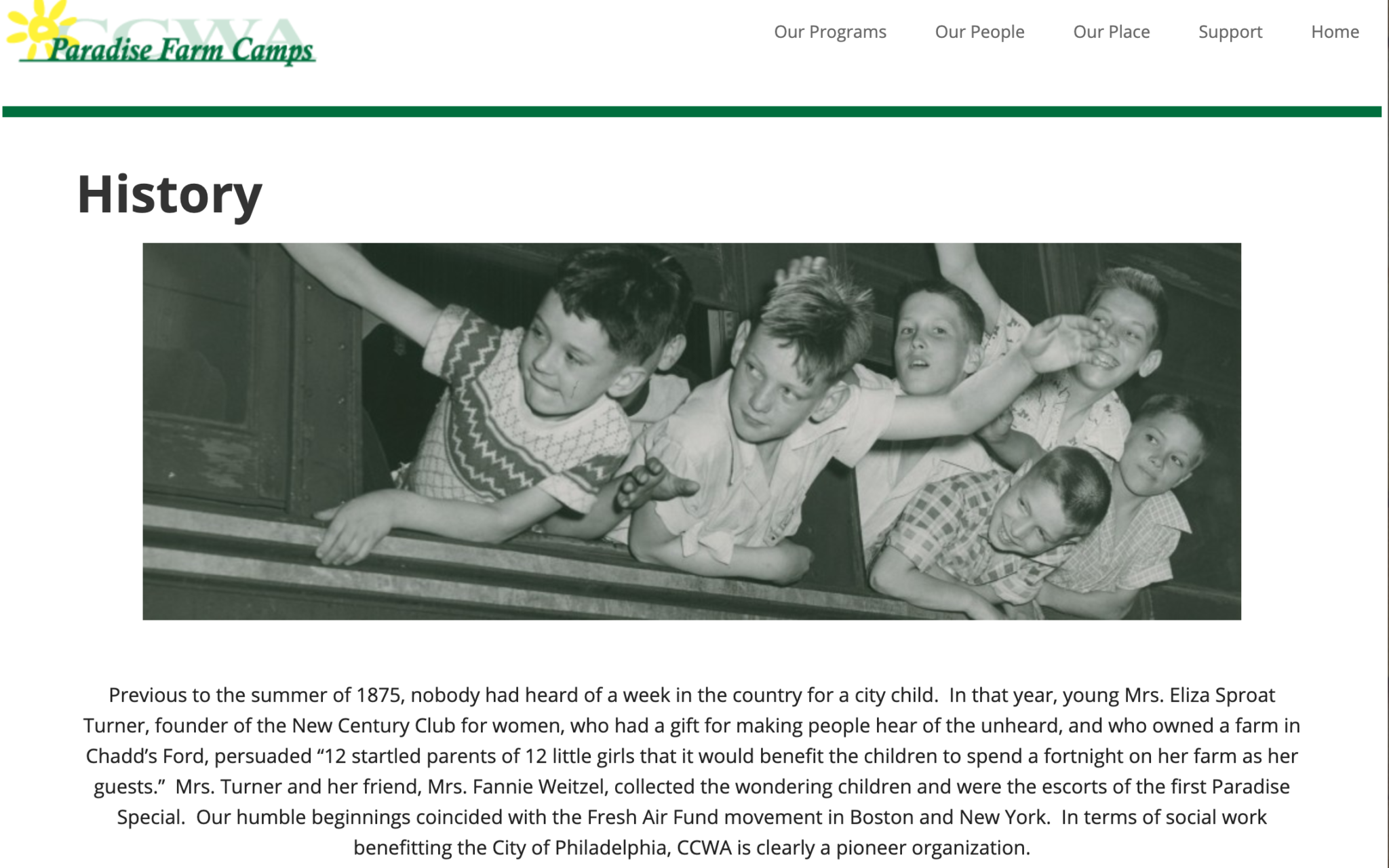
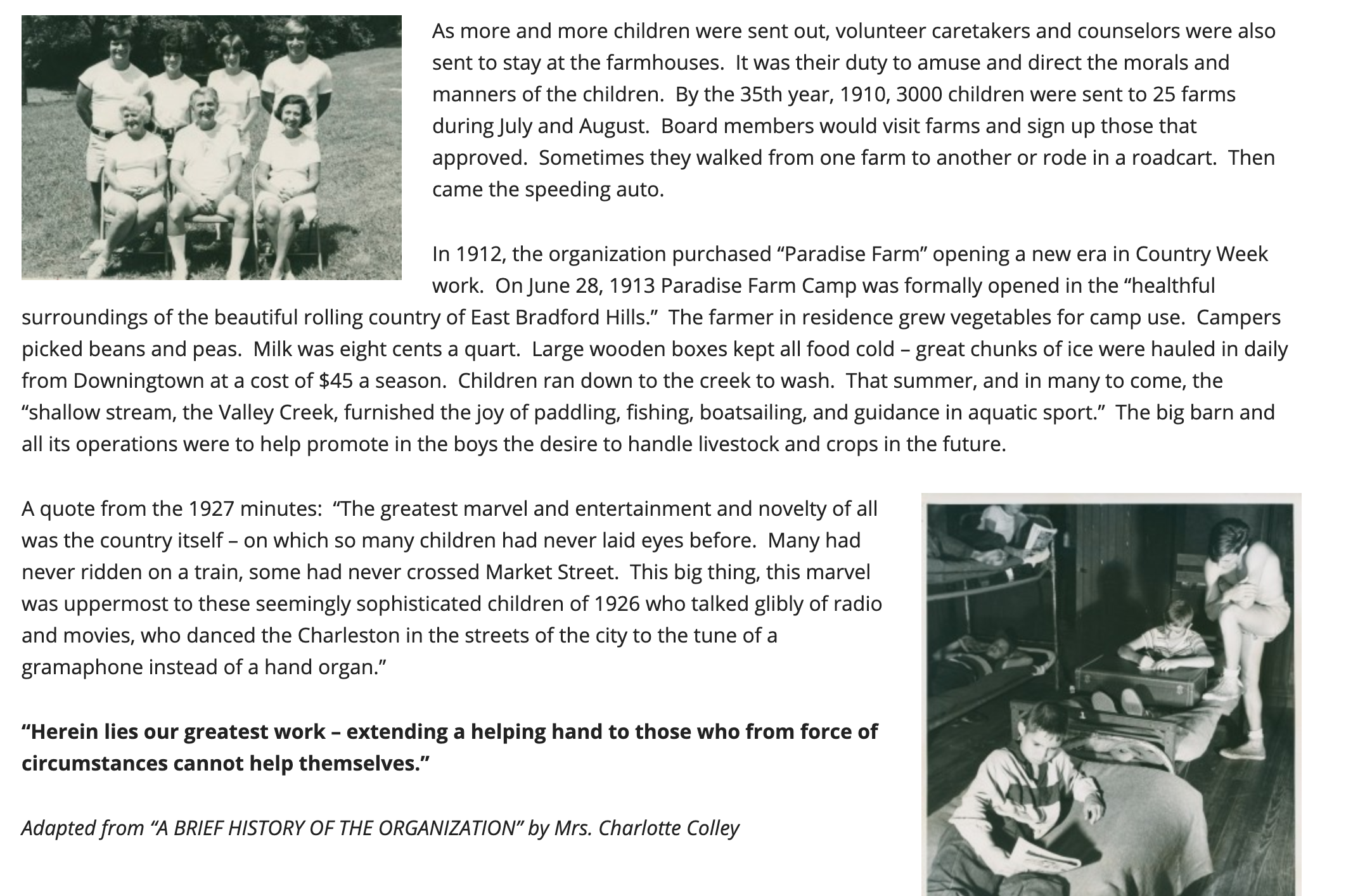
Likewise, YMCA Camp Tecumseh has a beautiful mission statement on its Facebook page, which tells the story of its approach to leadership:
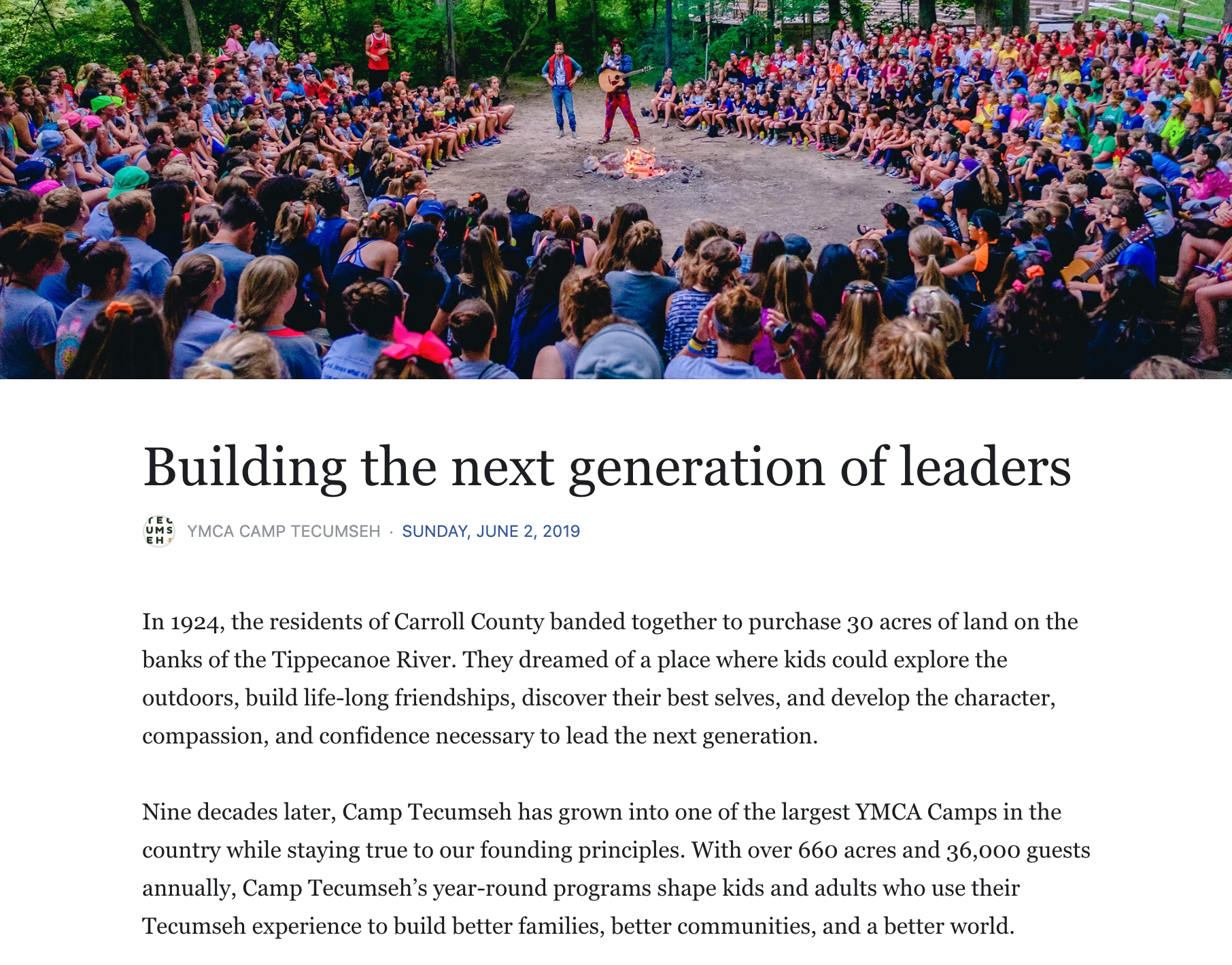
- Encourage your campers to tell their own stories. Activities that focused on family trees and origin stories are particularly compelling. Ghost stories, fiction narratives, and written stories are also excellent outlets.
When you create an environment where stories abound, you’ll find that the story of your camp virtually tells itself.
2. Take Lots of Pictures
We’ve all heard a picture is worth a thousand words. When you’re trying to tell your camp’s story, images are a valuable tool. While camps have been taking photographs for years, the way you arrange, present, and share them goes a long way toward shaping your camp’s story.
For example, check out how the Frost Valley YMCA camp does this on their Facebook page:
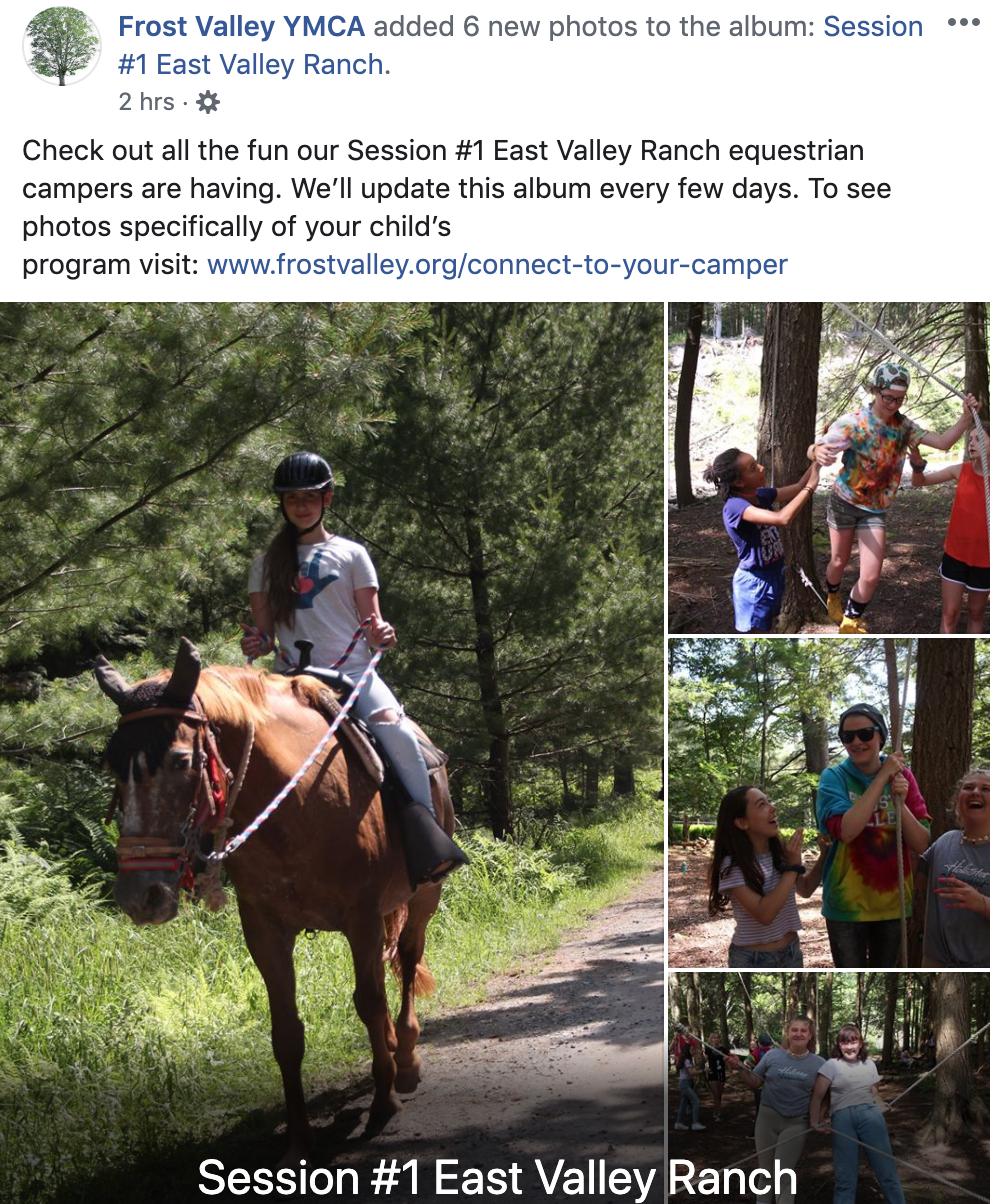 Frost Valley YMCA makes it possible for families to click a link and navigate to pictures of their specific camper. This is an excellent idea, as it allows families to follow their camper’s unique journey, rather than sifting through endless group photos for a glimpse of their child. To put this another way, it allows families to become more active participants in the camp story, without bending over backward to do so.
Frost Valley YMCA makes it possible for families to click a link and navigate to pictures of their specific camper. This is an excellent idea, as it allows families to follow their camper’s unique journey, rather than sifting through endless group photos for a glimpse of their child. To put this another way, it allows families to become more active participants in the camp story, without bending over backward to do so.
3. Create and Share “UGC”
In the world of marketing, user-generated content (UGC) has become a big deal. In addition to boosting customer confidence, UGC helps narrate the culture of a company or brand, which humanizes the brand. The same goes for camp programs.
One of the best ways to tell your camp’s story is to literally tell its story. For example, we encouraged camp stories in one of our recent blogs Why did I keep Returning to Camp? One Counselor’s Story:
“Being a counselor at the same camp I grew up attending, I knew it was a special place. It was a place of comfort that I could be myself. When I returned home as a kid, after a week at camp, I always felt the best version of myself and cleared of my daily distractions. At the time, I believed this was from just being relaxed and having fun. Coming on as staff, I was fully prepared for the goofy games, lunchtime chants, and silly campfire songs. I knew I would make some friends and have fun. What I was not prepared for, was the way that I would see myself, my fellow counselors, and my campers grow and learn from each other.”
To promote your camp in an authentic and meaningful way, let your campers, counselors, and other staff explain how camp has impacted them. Have campers write brief pieces about what they learned at camp, or take to Facebook to share your counselor’s stories of why they keep coming back to your program, year after year. Nothing will tell your story as powerfully as the people who are intimately involved in it.
4. Focus on Connection
As a camp administrator, you walk a fine line. Our society is disconnected, digitally-deluged, and jaded about many things. Walk into any city in America, and you’ll find a large number of kids who favor screen time and social media over spending time outdoors, with in-person friends. This disconnect is more than just inconvenient – it’s also dangerous. Left unchecked, it can lead to everything from childhood obesity to anxiety and depressive disorders.
Fortunately, camp is an antidote to all of these things. As the world changes, the culture of camps must change, also. While digital detoxes used to be a given at summer camps (no cell phones made it pretty easy to unplug and relax), today’s camps must find ways to foster connection while also encouraging healthy disconnection. Perhaps your camp encourages letter writing, for example, but limits cell phone use.
No matter how you choose to do it, cultivating a conscious connection between your campers, staff, and employees will make your camp a more enjoyable place. It will also strengthen your camp story, and help you solidify what you stand for.
5. Use Tech to Your Advantage
Telling your story is an integral part of your camp’s culture, but it’s also an essential part of your camp’s marketing. If you want the story to travel as far as possible, you’ve got to master the art of giving it a boost. This is where tech comes in as a critical tool. When you use technology to your advantage, you not only enhance your story, but you make it more accessible for people around the globe.
Here are a few platforms to consider using for your summer camp marketing efforts:
-
- . Facebook is a critical tool for summer camp marketing. In addition to being robust and flexible, it’s also versatile enough to help you share updates, pictures, and anything else you want to get out there. We wrote a post on the Campminder blog about using Facebook for summer camp marketing –
-
- for more information.
Instagram. Again – pictures are some of the most critical assets for telling your camp’s story. Using Instagram to share images is a great way to promote your camp culture and connect with your audience. Check out our post on Instagram for summer camps here.
Campanion. Campanion is an app built by summer camp experts for summer camp experts. The app organizes photos into streams and auto-tags campers. It also provides highly-personalized, curated streams of content and a personalized camp story for each family and child.
The Summer Camp Story: a Coming of Age Tale
No matter how much times change, summer camp remains a critical growth moment for many people. Whether camp taught you to be independent, foster relationships, or – yes – start a fire, camp changed you in some way. This is true for so many people, and it’s this truth that continues to earn summer camp a place in the hearts of so many.
When you commit yourself to the story of your camp, you give your campers, counselors, and employees a chance to live their summer camp experience, as well. While these tips can help you flesh out and share your camp’s story, the things that truly make the story – your location, your campers, your leadership, and your mission – are unique to you and only you.



